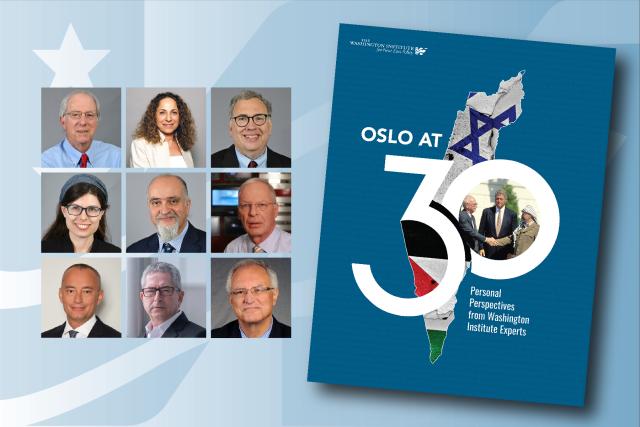
Oslo Accords Compendium Reflects on Past, Future of Arab-Israeli Peace
Experts and former officials mark the Accords’ Thirtieth Anniversary

Washington, D.C. - On the thirtieth anniversary of the landmark Oslo I Accord, the Washington Institute for Near East Policy has published a remarkable compendium that includes essays by officials who played significant roles in the Israeli-Palestinian peace process from the deal’s signing in September 1993 through the present. The volume includes personal perspectives from former diplomats, analysis of public opinion among Israelis and Palestinians, and policy recommendations for U.S. officials.
The writers conclude that while the prospects for peace appear dim at the moment, wise policymaking may yet fulfill the promise of the Oslo Accords.
The essays are:
30 Years Later, the Oslo Vision Can Still Be Revived, by Dennis Ross and David Makovsky
In this Washington Post op-ed, the writers review the history of the accords and discuss the potential for peace in the near term. Ross played a leading role in shaping U.S. involvement in the peace process, dealing directly with the parties as the U.S. point person in both the George H. W. Bush and Clinton administrations. Makovsky served as senior advisor to the State Department’s special envoy for Israeli-Palestinian negotiations in 2013-14.
The Palestinian Authority Thirty Years After Oslo, by Neomi Neumann
Neumann, the former head of the research unit in the Israel Security Agency, known popularly as the Shin Bet, explores whether the Oslo Accords can provide a path to peace despite the many challenges facing the Palestinian Authority today, especially those that will emerge after President Mahmoud Abbas exits the stage.
The Palestinian Authority: A Flawed but Necessary Legacy of Oslo, by Ghaith al-Omari
Omari, who served as advisor to the Palestinian negotiating team during the 1999-2001 permanent-status talks, writes that despite its shortcomings, the Oslo process served—and continues to serve—key Palestinian interests. The collapse of its framework today could deal a mortal blow to Palestinian national aspirations.
Oslo at 30: A Personal Perspective, by Ehud Yaari
A veteran Israeli journalist and Middle East analyst, Yaari asserts that PLO chairman Yasser Arafat signed the Oslo Accords “to gain a foothold in the land. He had never considered a long-term compromise.” Yet he adds that the accords “should not be discarded but corrected to serve as the foundation of a reinvigorated political platform.”
The Oslo Accords Held Promise; Extremists Derailed Them, by Mohammed Dajani
The Palestinian peace activist writes that “it is not the Oslo Accords that failed us, but Israelis and Palestinians who failed Oslo.”
Beyond Oslo: Reflections on Peace, Promise, and Possibility, by Nickolay Mladenov
The UN special coordinator for the Middle East peace process from 2014 to 2020, Mladenov believes that “in spite of its massive challenges, the thirty-year journey post-Oslo era is not without its achievements...The solution isn’t in unraveling what has been built during the past three decades but building upon what has been achieved.”
Implications of the Second Intifada on Israeli Views of Oslo, by Zohar Palti
Palti, who retired from Israel’s Ministry of Defense in 2022 after a distinguished career in the country’s national security establishment, asserts, “The best hope is for Israel to one day reach a decision for a separation of the two peoples with international recognition of the outcome, unlike what occurred with the Gaza disengagement.”
New Polling and the Legacy of the Oslo Accords, by Catherine Cleveland
The Institute’s Croft-Wagner Family Fellow and managing editor of its Fikra Forum reveals the results of recent polls, which emphasize the deep erosion of trust and support for the two-state solution in Palestinian and Israeli society, but also document a lingering hunger for some kind of breakthrough.
Institute experts and former officials assessed the past and future of the accords during a recent Institute Policy Forum.
An Inside Look at Rabin’s Oslo Expectations, by David Makovsky
The coauthor of the book Be Strong and of Good Courage: How Israel’s Most Important Leaders Shaped Its Destiny (PublicAffairs, 2019) discusses then-prime minister Yitzhak Rabin’s motivations in light of the declassified transcript of a landmark 1993 Israeli cabinet meeting in which ministers debated and approved the first Oslo Accord.